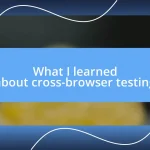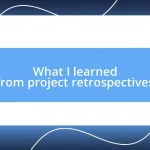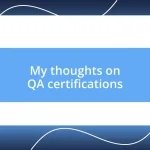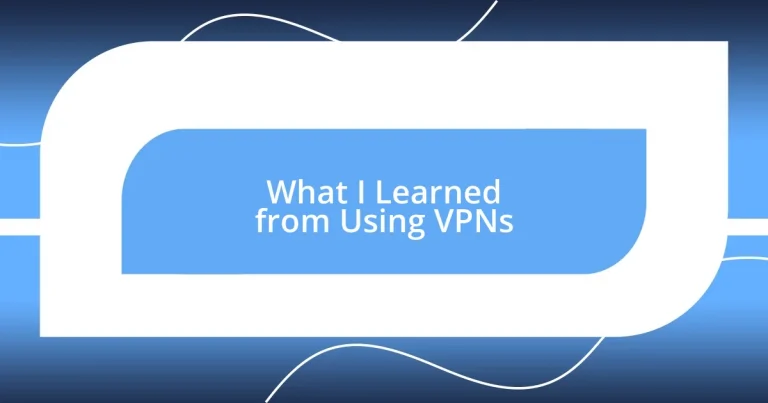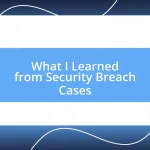Key takeaways:
- Using a VPN enhances online privacy, secures sensitive data, and allows access to geo-restricted content, offering peace of mind while browsing.
- Choosing the right VPN requires considering factors like speed, server locations, no-log policies, user-friendliness, and customer support to meet individual needs.
- Common misconceptions about VPNs include the belief that they guarantee complete anonymity and eliminate all risks associated with public Wi-Fi, highlighting the importance of informed usage.
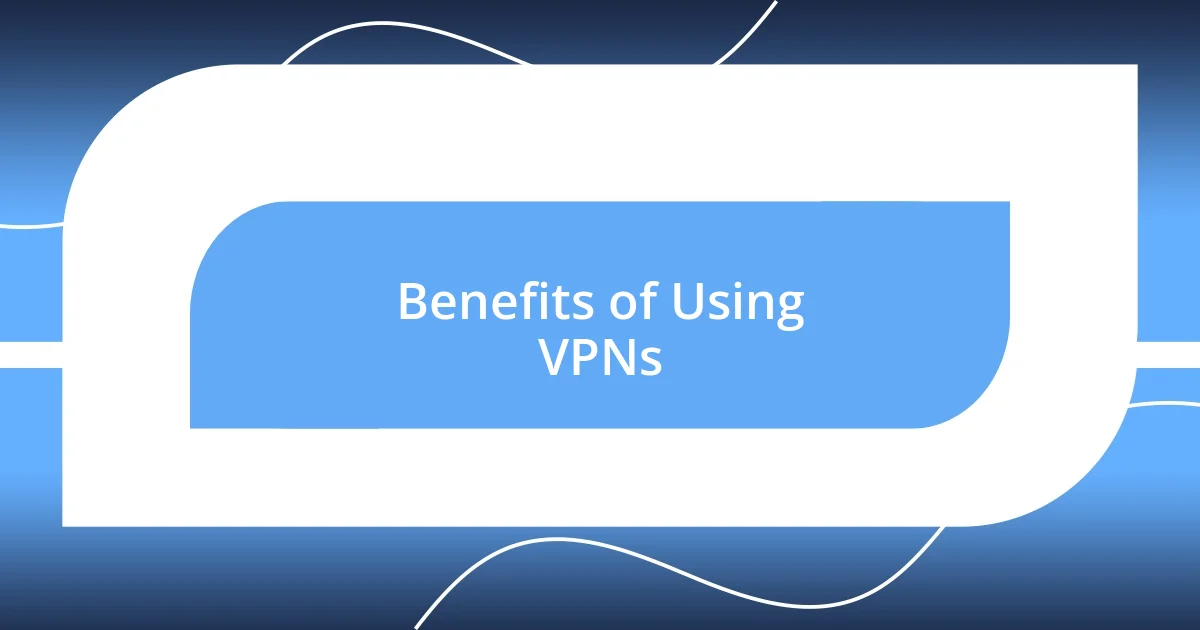
Benefits of Using VPNs
One of the primary benefits of using a VPN is enhanced online privacy. I remember the first time I connected to public Wi-Fi at a coffee shop; I felt a wave of unease about my data being exposed. With a VPN, I quickly realized that my browsing activity was kept private, creating a sense of security that’s hard to overstate.
Another major advantage is accessing geo-restricted content. I often found myself frustrated when I couldn’t watch certain shows or sports events available only in other countries. The first time I switched my location via a VPN to enjoy my favorite series, it felt like unlocking a treasure chest of entertainment. Isn’t it liberating to know you can access content regardless of where you are?
Moreover, VPNs add an extra layer of security when dealing with sensitive information. I recall a moment when I was sending personal data while traveling; my heart raced thinking about potential risks. With a VPN, I felt a wave of relief knowing my information was encrypted and protected from prying eyes. This peace of mind is invaluable in today’s digital world.
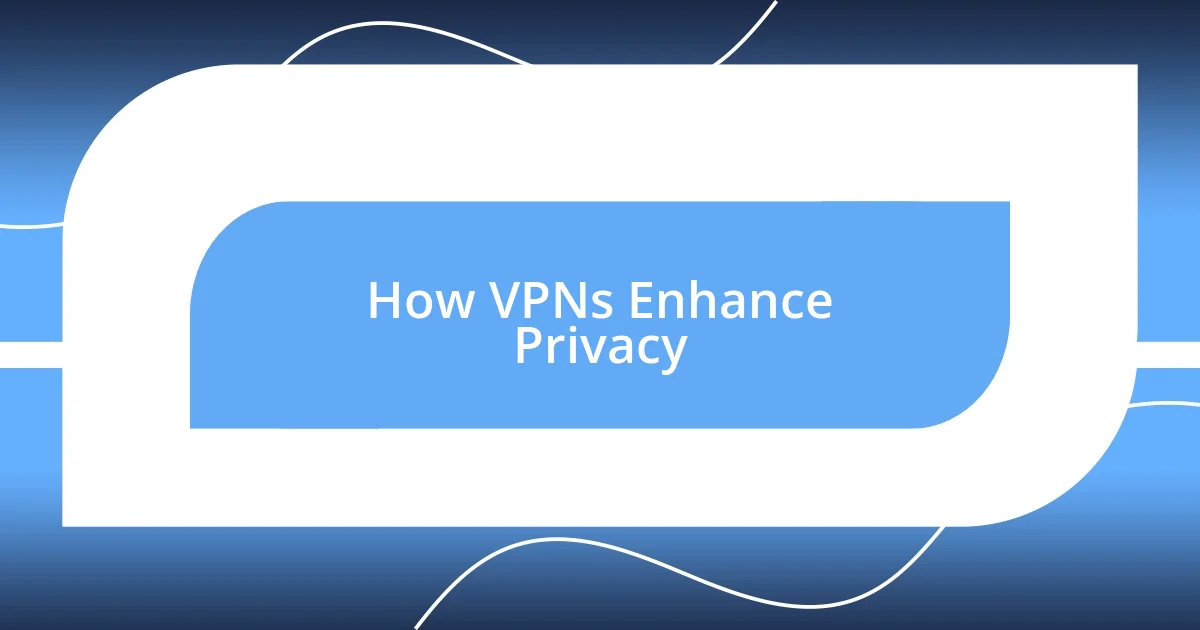
How VPNs Enhance Privacy
Using a VPN fundamentally shifts the way we think about our online presence. When I first started using one, I was amazed at how it masked my IP address. For me, it felt like I was wearing an invisibility cloak online, allowing me to browse without being tracked. This anonymity is crucial since my online activities often involve sharing personal opinions, and I value the ability to express myself without fear of judgment or surveillance.
Additionally, VPNs encrypt your internet traffic, making it near-impossible for anyone to snoop on your data. One evening, while working late and connected to my home network, I learned just how vulnerable my sensitive files could be; my VPN kept my conversations and information safe from anyone who might try to intercept them. This level of security gives me a sense of control over my own data, something I believe everyone deserves.
Ultimately, the peace of mind gained from using a VPN is something I never take for granted. I can’t help but smile when I remember my travel adventures, where accessing my favorite news sites was just a click away, all while feeling secure. In a world where digital privacy seems to be disappearing, VPNs not only enhance privacy but remind us that we can reclaim our digital footprint.
| Feature | Impact on Privacy |
|---|---|
| IP Masking | Prevents tracking and profiling by websites and advertisers |
| Data Encryption | Secures sensitive information from hackers and eavesdroppers |
| Public Wi-Fi Protection | Safeguards personal data when connected to unsecured networks |
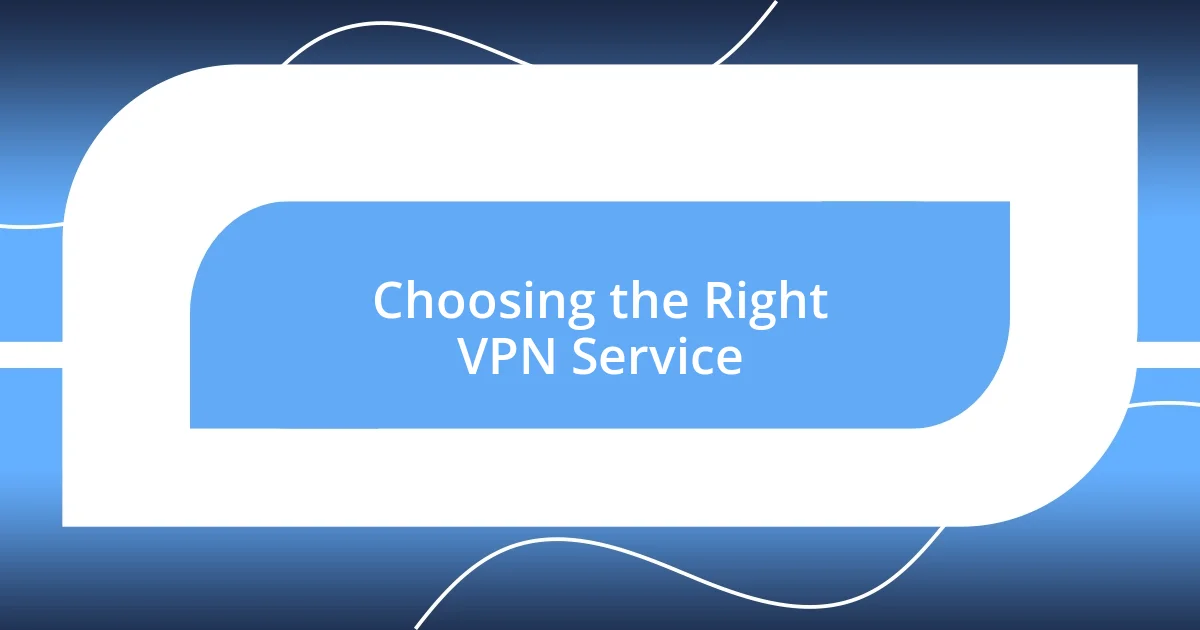
Choosing the Right VPN Service
Choosing the right VPN service can feel overwhelming, especially with so many options available. I remember feeling like a kid in a candy store, but the wrong choice can lead to dissatisfaction. It’s crucial to consider factors like speed, server location, and security features. I’ve had VPNs that promised high speeds, only to leave me frustrated while buffering my favorite shows. Navigating reviews and trial periods has often helped me find a reliable service that genuinely fits my needs.
Here are some key points to consider when selecting a VPN service:
- Speed and Performance: Look for services that ensure fast connection speeds to avoid interruptions during streaming or gaming.
- Server Locations: More server options provide greater flexibility for accessing geo-restricted content.
- No-Log Policy: Choose a VPN that does not track your online activities for maximum privacy.
- User-Friendly Interface: A simple interface makes it easier to navigate, especially if you’re new to VPNs.
- Customer Support: Reliable customer service is essential if you encounter issues or need assistance.
By evaluating these features, I’ve learned to confidently choose VPN services that align with my online needs, enhancing both my experience and security.
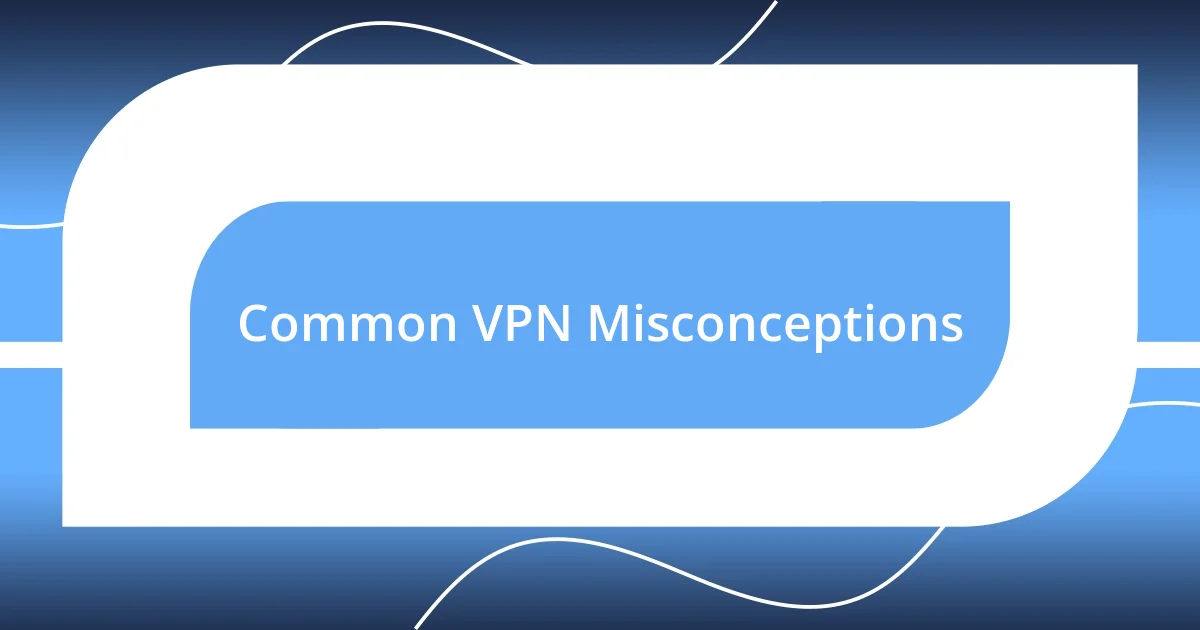
Common VPN Misconceptions
It’s easy to fall prey to the myth that using a VPN guarantees absolute anonymity. I used to think that once I turned on my VPN, no one could ever trace my online footprints. However, I quickly learned that while a VPN enhances privacy, it doesn’t make you invisible. For instance, I mistakenly believed I could engage in questionable browsing activities without consequences. The truth is, if you’re signed into accounts like Google or social media platforms, they can still track your activities. Understanding this helped me become more mindful of my online habits.
Another common misconception I encountered is that VPNs eliminate all risks while using public Wi-Fi. I remember one night in a bustling café, feeling invincible as I connected through my VPN. Sure, the encryption adds a layer of protection, but it doesn’t prevent malicious attacks if you’re not cautious. Sometimes, it’s easy to forget that other vulnerabilities like phishing attacks or unsecured networks can still jeopardize your security. The experience taught me that a VPN is just one piece of the puzzle.
I also used to think that just any VPN would suffice for my needs, but each service can vary significantly in quality and features. After trying a few that turned out to be disappointments, I realized that not all VPNs are created equal. Some of them had logging policies that made me uncomfortable, while others were slow and unreliable. This experience really made me appreciate the importance of doing thorough research before committing. Isn’t it fascinating how a simple tool can spark such a journey of discovery about privacy, security, and the broader implications of our digital lives?
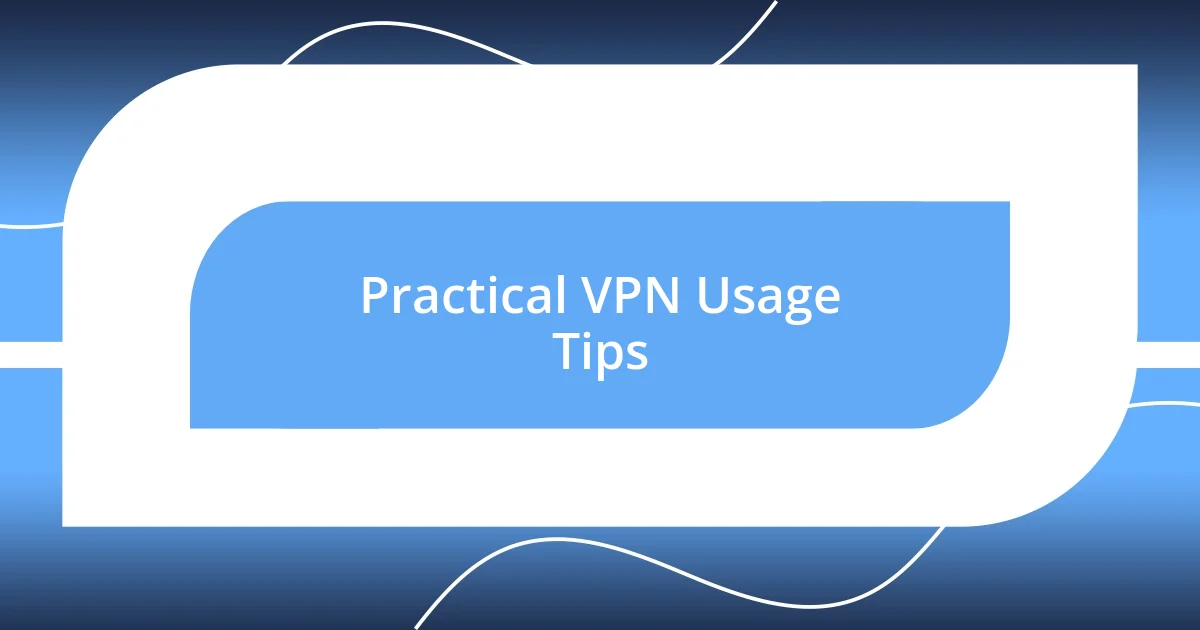
Practical VPN Usage Tips
Using a VPN effectively comes down to understanding its features and settings. I’ve found it incredibly useful to spend a little time exploring the menus and options available in the app. For instance, I once stumbled upon a setting for a “kill switch,” which automatically disconnects your internet if the VPN drops unexpectedly. This small feature, which I initially overlooked, has since given me peace of mind knowing I won’t accidentally expose my data.
Another tip is to regularly switch server locations. I used to stick to one server thinking it was the best option, but switching it up not only improved my connection speed but also opened up access to content I couldn’t view before. Have you ever tried connecting to a different country? You might be surprised by what you can stream or access—it’s like finding a hidden treasure in your digital experience!
Lastly, I strongly recommend taking advantage of any free trials. They’ve allowed me to test multiple VPNs before making a commitment. I remember one trial helped me discover that a provider advertised fast speeds but couldn’t deliver during peak hours. This insight saved me from a long-term headache and financial loss. Have you considered giving trials a go? It’s a practical way to ensure you’re making the right choice without any pressure.
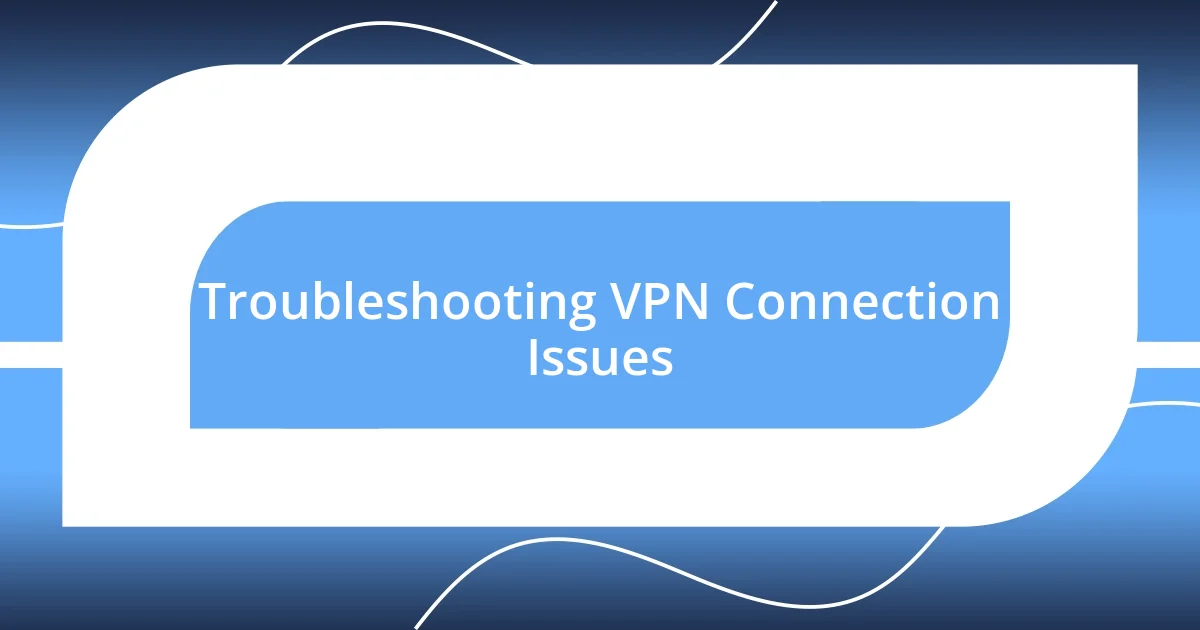
Troubleshooting VPN Connection Issues
When troubleshooting VPN connection issues, I’ve learned that the first step is to check your internet connection. I remember one time, I got so frustrated trying to connect to my VPN, only to realize my Wi-Fi was acting up. It’s always worth spending a few moments ensuring your internet is stable before you dive deeper into troubleshooting. Has that happened to you too? Sometimes the simplest solution is the easiest to overlook.
If your VPN won’t connect, looking into firewall settings can often uncover the problem. There was a time when my VPN decided to play hard to get because of my firewall’s strict settings. It dawned on me that sometimes the barriers to access are not just with the VPN itself but also with security protocols on my device. A quick adjustment there often helped me get back on track, and I learned to treat firewall configurations like the gatekeepers; if they don’t like what they see, they might just turn you away.
Occasionally, the culprit behind frustrating connections can be outdated software. I experienced this firsthand when my VPN app refused to cooperate after a recent device update. I had neglected updating the app, and the disconnection was simply a matter of compatibility issues! Now, I make it a point to keep everything current, whether it’s the VPN client or my operating system. Isn’t it interesting how technology can throw us a curveball like that? By staying proactive in these areas, I’ve found that I can minimize hiccups with my VPN experience.
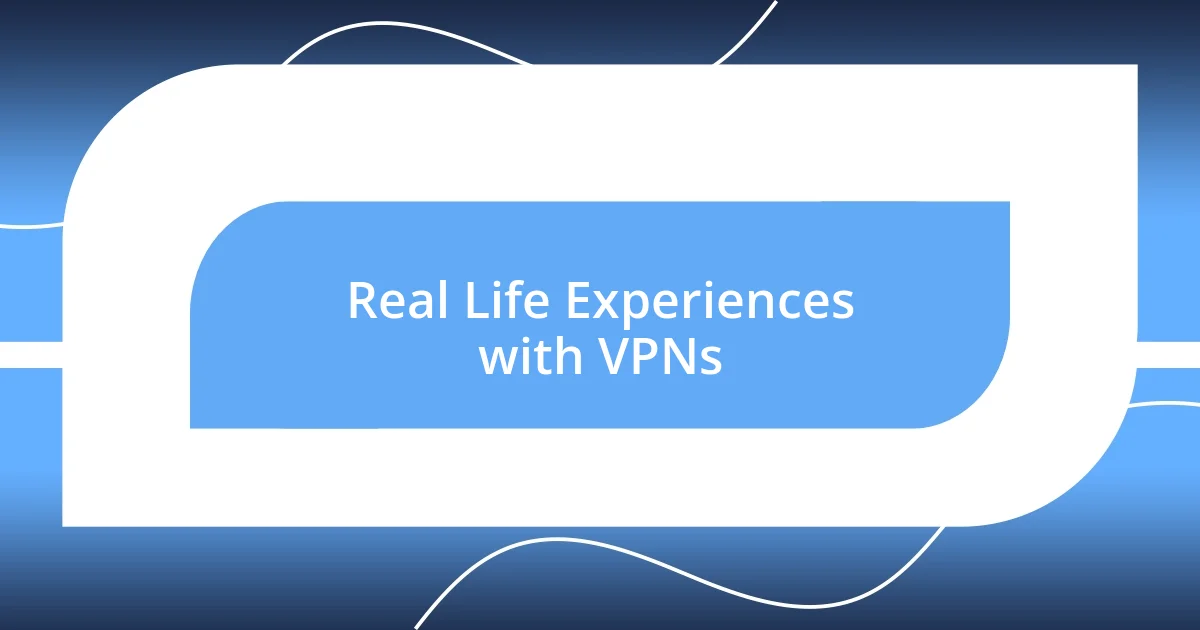
Real Life Experiences with VPNs
I remember the first time I used a VPN. I was traveling abroad and wanted to access my favorite streaming service, but it was blocked! I felt a wave of frustration wash over me until I remembered my trusty VPN. Connecting to a server back home felt like a digital lifeline, and in that moment, my stress transformed into sheer joy as I resumed my binge-watching marathon. Have you ever had a similar experience where a VPN suddenly opened up your online world?
There’s something fascinating about discovering the range of options that a VPN can provide. One afternoon, I decided to hop on a server in Japan, just to see what was accessible. To my amazement, I found an array of shows that I had never heard of before. Not only was it a fantastic way to explore new content, but it also sparked a curious joy inside me. Isn’t it incredible how technology can introduce us to new cultures and experiences from the comfort of our homes?
On another occasion, I faced a moment of panic when I realized I had forgotten to activate my VPN before connecting to public Wi-Fi at a café. My heart raced as I rushed to enable it. This taught me that a VPN is not just a convenience; it’s a necessity in our increasingly interconnected world. Since then, I’ve made it a personal rule to check my VPN anytime I go online, especially in public spaces. Have you ever felt that knot in your stomach when you forgot to secure your connection? Those moments serve as powerful reminders to stay vigilant online.







